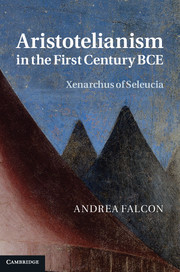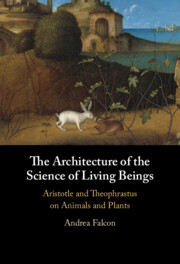Aristotelianism in the First Century BCE
This book is a full study of the remaining evidence for Xenarchus of Seleucia, one of the earliest interpreters of Aristotle. Andrea Falcon places the evidence in its context, the revival of interest in Aristotle's philosophy that took place in the first century BCE. Xenarchus is often presented as a rebel, challenging Aristotle and the Aristotelian tradition. Falcon argues that there is more to Xenarchus and his philosophical activity than an opposition to Aristotle; he was a creative philosopher, and his views are best understood as an attempt to revise and update Aristotle's philosophy. By looking at how Xenarchus negotiated different aspects of Aristotle's philosophy, this book highlights elements of rupture as well as strands of continuity within the Aristotelian tradition.
- A full study of the surviving evidence for Xenarchus of Seleucia, one of the earliest interpreters of Aristotle
- Examines the reception of Aristotle's philosophy in the first century BCE
- Explores the impact of key Aristotelian doctrines in the Middle Ages and beyond
Reviews & endorsements
"Andrea Falcon's splendid new work on one of Aristotle's ancient Greek followers, Xenarchus, offers an elegant example of the potential for the commentary format to address larger questions than the ideas of a single author … This is an excellent volume by a thoughtful and careful scholar sensitive to philosophical as well as historical issues …"
Aestimatio
"Xenarchus of Seleucia was a contemporary of Strabo who was active as a teacher of philosophy in Alexandria, Athens and Rome at the time of Augustus. Falcon’s study is the first monograph to be wholly dedicated to this Peripatetic writer, from whom a few fragments survive … a valuable tool for the study of a period of philosophical activity that is still surrounded by mystery, and contributes to the better understanding of the hermeneutical strategies towards Aristotle’s text that preceded the development of the commentary tradition in the Imperial period."
Bryn Mawr Classical Review
Product details
February 2012Hardback
9780521876506
240 pages
235 × 159 × 17 mm
0.52kg
Available
Table of Contents
- Introduction
- 1. Xenarchus: the man, his work, and his influence in antiquity
- 2. Texts, translations, and notes
- Conclusion
- Appendix. Vestiges of Xenarchus in the Middle Ages.






